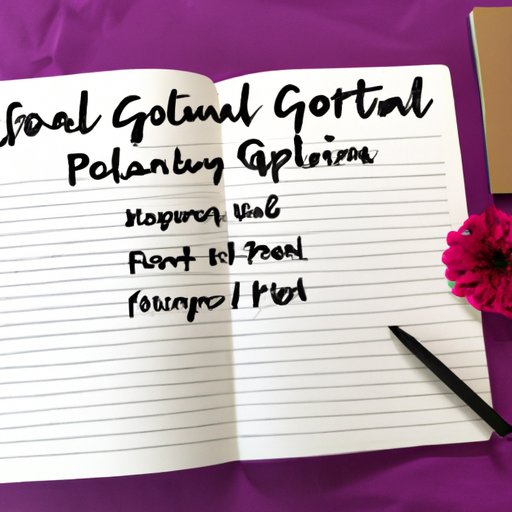Introduction
Journaling is a popular activity that many people are turning to for personal growth and self-care. It can help you process your thoughts, feelings and experiences while allowing you to express yourself in a creative and meaningful way. Starting a journal can seem daunting, but it doesn’t have to be. This guide will provide an overview of all the steps to get started on a successful journaling journey.
Deciding What Type of Journal You Want to Write
The first step to starting a journal is deciding what kind of journal you want to write. There are three main types of journals: daily, weekly, and monthly. A daily journal is a great way to capture your thoughts and emotions each day. It can also help you track your progress over time. A weekly journal is more relaxed and allows for more reflection. It can be helpful for making big decisions or reflecting on the past week. Finally, a monthly journal is great for tracking longer-term goals and reflecting on the month as a whole.
Setting Goals and Parameters
Once you’ve decided on the type of journal you want to write, it’s important to set goals and parameters for your journal. Establishing goals can help you stay focused and motivated. For example, if you’re writing a daily journal, you might set a goal of writing 500 words each day. Choosing topics to focus on can also be helpful. If you’re writing a weekly journal, you might choose to focus on one topic each week. Additionally, it’s important to set other parameters such as when and where you’ll write. Setting these parameters can help ensure that you stick to your journaling routine.
Choosing a Format
The next step is to choose a format for your journal. There are three main formats: paper journals, online journals, and audio or video recordings. Paper journals are the most traditional option and can be a great way to get creative with your entries. Online journals can be a great way to share your entries with others or keep them private. Audio or video recordings can be helpful for capturing your thoughts and feelings more accurately. Whichever format you choose, it’s important to find something that works for you.

Finding a Comfortable Place to Write
It’s also important to find a comfortable place to write. Being alone and uninterrupted can help you focus on your journaling. You might choose to write in a quiet corner of your house, in a park, or even at a coffee shop. The key is to find a place where you feel safe and comfortable.

Starting With a Writing Prompt
If you’re feeling stuck or uninspired, starting with a writing prompt can be helpful. Writing prompts can help generate ideas and get your creative juices flowing. There are many websites and books dedicated to providing writing prompts, so you’re sure to find something that resonates with you.
Taking Your Time
Finally, it’s important to take your time with your journaling. Allow yourself to explore different ideas and express your thoughts and feelings without judgement. According to a study published in the Journal of Clinical Psychology, “Journaling can help individuals gain insight into their own lives, develop problem-solving skills, and reduce stress and anxiety.” So give yourself permission to take your time and enjoy the creative process.
Conclusion
Starting a journal can be a great way to explore your thoughts, feelings, and experiences. Decide what type of journal you want to write, set goals and parameters, choose a format, find a comfortable place to write, start with a writing prompt, and take your time. With these tips, you’ll be able to make the most out of your journaling experience.
(Note: Is this article not meeting your expectations? Do you have knowledge or insights to share? Unlock new opportunities and expand your reach by joining our authors team. Click Registration to join us and share your expertise with our readers.)
